College of Human Sciences
UNILISA 2025 urges academics to be part of the Fifth Industrial Revolution
Unisa’s Department of Information Science, in collaboration with Unisa Library and Information Services (LIS) and the national Department of Sport, Arts and Culture, hosted the fourth University of South Africa Biennial International Conference on Library and Information Science in Africa (UNILISA), commencing on 1 April 2025. This year’s conference theme was "Information science for futuristic scholarship and practice: Partnerships and collaborations across boundaries towards Society 5.0".
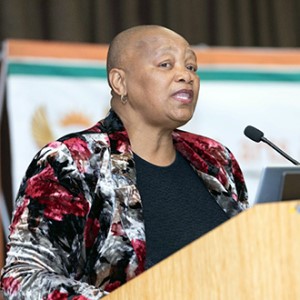
Prof Zethu Nkosi, Executive Dean: CHS, officially opening the UNILISA Conference
Prof Zethu Nkosi, Executive Dean of the College of Human Sciences, welcomed the conference attendees, noting that the theme aptly captures the pivotal role of information science in advancing scholarship and practice to serve the sophisticated needs of Society 5.0. "The conference aims to unlock the future of information science by bringing together experts and thought leaders from around the globe to explore innovative partnerships and collaborations for a better tomorrow," she said.
Nkosi further applauded the Department of Information Science for having maintained high standards in hosting a prestigious conference over the past three years. "The Department of Information Science in the School of Arts is the biggest department in Africa, and I must say that this department has been excelling over the past years." Nkosi encouraged attendees to use the conference to foster collaboration and to promote innovative approaches to building a smarter, more connected world.
Prof Mpho Ngoepe, Executive Director of Unisa LIS, and Kepi Madumo, CEO of the National Library of South Africa, delivered messages of support, highlighting the importance of the conference and encouraging attendees to be active participants in the digital space and to be part of this revolution.
Vusithemba Ndima, Deputy Director-General of the Department of Sport, Arts and Culture, began his keynote address by expressing his gratitude for being invited to share his thoughts on the theme of the conference. Ndima stated that UNILISA is a platform that gives attendees the opportunity to interrogate how the information science profession can support research and offer library and information services (LIS) in the Fifth Industrial Revolution (5IR). "It is also imperative that academia and practice collaborate effectively to ensure that LIS education aligns with and responds to the needs of the broader professional landscape," he added.
He further urged the National Archives and Records Service of South Africa, the National Library of South Africa, and academic libraries to adopt and implement 5IR technologies such as artificial intelligence (AI), and robotic and cobotic machines in the provision of services.
Ndima said that government plays a critical role in ensuring that libraries and archives across the country are equipped with the necessary resources, and that their staff are adequately trained to master and utilise these innovative technologies.
While acknowledging the impact and progress Unisa has made over the years through UNILISA, he suggested that, in order to make an even greater impact and to encourage the younger generation – who may later join the GLAM (galleries, libraries, archives and museums) sector – the conference organisers should consider introducing a UNILISA learner programme. Ndima explained that such a programme can grant learners an opportunity to learn about the numerous career opportunities available in the sector and further create a platform to engage young people on the roles they can play, whether as volunteers or as part of Friends of Libraries associations in their school and community libraries.
In addition, he stated that while UNILISA is an academic conference where academic papers and research findings are presented, scholars should not overlook the next generation that will be taking up the baton from them. In concluding his address, he referred to the isiZulu proverb ligotywa lisemanzi (simply translated as "bend the stem of a tree while it is still budding"), underscoring the importance of nurturing and guiding young talent.
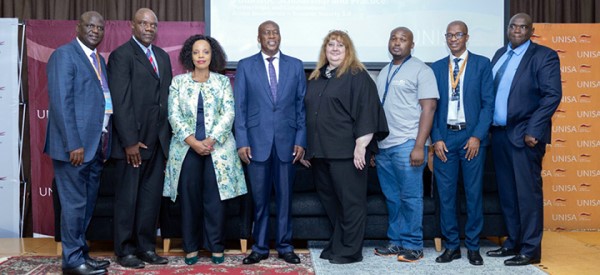
Puleng Kekena (Chief Director: National Archives and Libraries), Prof Arthur Mutambara (University of Johannesburg), Dr Refiloe Mabaso (Chairperson of the National Library of South Africa), Vusi Ndima (Deputy Director-General: Department of Sport, Arts and Culture), Dr Makutla Mojapelo (Department of Information Science), Prof Mpho Ngoepe (Executive Director: Unisa LIS) and Prof Maoka Dikotla (Department of Information Science)
Notable speakers during four days of the conference include Prof Arthur Mutambara from the University of Johannesburg, who explored advancements in AI, Prof Forget Chaterera-Zambuko from the Sorbonne University Abu Dhabi, Puleng Kekana, Chief Director: National Archives and Libraries, who offered valuable insights into archival practices and information management, and Prof Adeyinka Tella from the University of Illinois Nigeria, who contributed to the discussions with his expertise. Their collective knowledge and experience inspired thought-provoking conversations and innovative strategies for the evolving LIS landscape.
The importance of partnerships and collaboration among and between organisations in the information science industry to strengthen its impact on Society 5.0 were key areas of exploration at the conference. As the world becomes increasingly interconnected through technology, it is vital to consider how these collaborations can thrive in Society 5.0. This segment of the conference focused on service delivery, the role of technology in enabling service delivery, education, readership, storytelling, and citizen science. UNILISA encourages the submission of practice-based papers, particularly those relating to case studies on collaborations and partnerships.
The UNILISA Conference 2025 concluded with a gala dinner, with PUKU Children’s Literature Foundation Executive Director, Elinor Sisulu, as guest speaker.
* By Nnana Martina Jege, Communication and Marketing Specialist, College of Human Sciences
Publish date: 2025-04-08 00:00:00.0


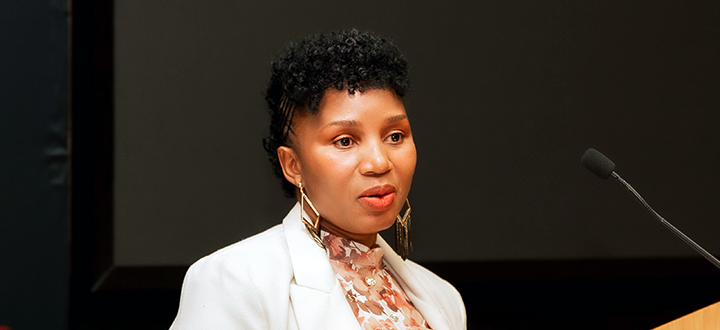 Wings of opportunity: Bringing drones into the classroom
Wings of opportunity: Bringing drones into the classroom
 Visionary youth champion to address Unisa’s Innovation Festival
Visionary youth champion to address Unisa’s Innovation Festival
 Finding the strength to persevere
Finding the strength to persevere
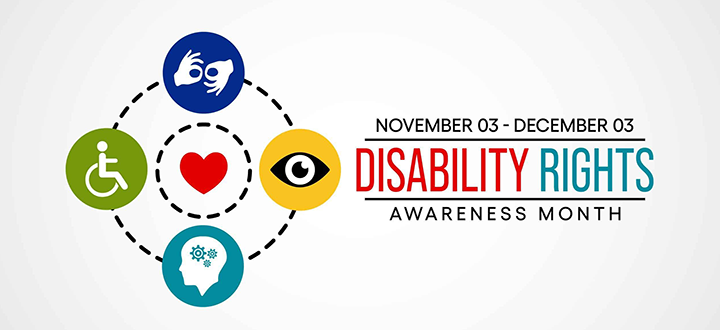 Disability awareness at Unisa: Disability is not inability
Disability awareness at Unisa: Disability is not inability
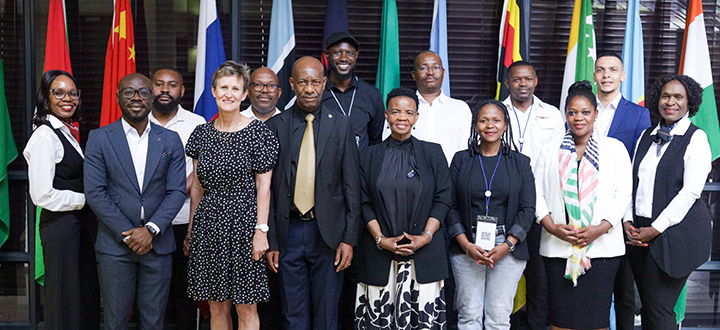 Unisa symposium shares knowledge on building SA's aviation economy
Unisa symposium shares knowledge on building SA's aviation economy